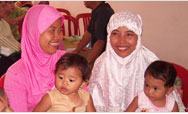| Activities |
- Support government efforts to decentralize authority to local levels through training, technical assistance, and visits to other countries where decentralization has occurred.
- Sponsor public hearings and fora on issues of decentralization of concern to local citizens, such as resource allocation and budget analysis.
- Support citizen meetings that identify and prioritize issues of local importance, and then engage local legislators in seeking solutions.
- Publish citizens' guides to local government structures including roles, responsibilities, and information on how taxes are distributed.
- Fund NGO development of plans and draft laws for redistribution of authorities between national and local governments.
- Bring national and state officials to local communities to meet with constituents, and demand their participation as a prerequisite to donor contribution.
- Help governments establish regional/local development funds.
- Sponsor local community leaders' travel to participate in national meetings on power sharing.
- Help local communities develop plans for management and allocation of local resources.
|
| Examples |
In Sumatra, Indonesia, OTI supported a series of public hearings at the district level in order to open the annual budget process to public scrutiny. (Previously, the budget was virtually a state secret.) At the hearings, civil society, and district governments were able to share information and give critical input on the budget. This activity was part of a larger OTI effort to help Sumatrans understand the implications of a new regional autonomy law.
In Peru, to prepare localities to take on responsibilities that previously rested at the national level, OTI supported public hearings and information campaigns to inform citizens about new budget and policy proposals and broaden participation in the policy-making process. OTI engaged local businesses, municipal officials, and advocacy groups in developing strategies for resource management, trade, and regulatory reform, and for attracting new industries. OTI also funded training workshops and policy seminars to help build relationships and mechanisms for continuing cooperation.
|


